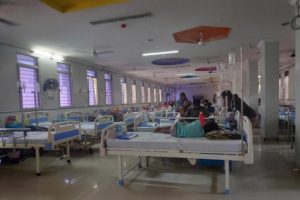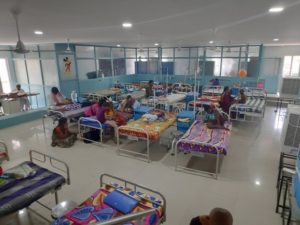Palliative care is a holistic treatment, not just medical diagnosis. We deal with their socio-economic issues and their families, who are badly affected and in shambles. In the case of cancer, they lose all their money on the treatment and in many cases family members quit jobs and/or drop out of school to take care of the patient.
The family of 16-year-old Rekha was understandably dejected when doctors told her that she didn’t have long to live. She was diagnosed with an advanced stage of cancer and had only a few months to live. Her family felt abandoned because the hospital they went to, refused to admit her because she was apparently a lost cause and they didn’t want to waste a precious hospital bed for a “doomed” patient. They were then informed of palliative care and were advised to immediately admit her into a hospice.

This is one of the few patients of non-communicable diseases (NCDs) admitted at a hospice in Hyderabad, where patients stay for anywhere from a few weeks to a few years. But the commonality between these patients is that they are facing inevitably painful deaths and yet spend the remainder of their lives as painlessly as possible. This is the central thought behind palliative care, an approach aiming to improve the quality of life of patients with a life-threatening illness and of their families.
The cause has been unable to garner enough awareness among potential patients and the general public. Although there has been some progress in the last five years, Hyderabad and India, in general, are poorly equipped to provide palliative care. It is estimated that less than 3% of patients in India have access to adequate palliative care. India ranks last in the list of 40 countries when it comes to the availability of painkillers for end-of-life care.
Awareness of palliative care is essential for patients with terminal or life-threatening illnesses so that they can forgo a lot of the pain associated with their treatment. This cause has been widely acknowledged by several other countries and even the World Health Organisation on World Health Day 2019, urging countries to invest in Primary healthcare, which includes palliative care, as the first step to universal healthcare.
The National Programme for Palliative Care (NPPC) was formed in 2012 with a goal to improve availability and accessibility of rational, quality pain relief and palliative care to the needy, as an integral part of healthcare at all levels. This programme has a huge scope to integrate palliative care into the public health system and remains under-utilised.
Only in October 2017 did the Telangana government finally tap into the available funding provided by the NPPC when they built a five-bed palliative care centre in the Area Hospital in Chevella and built seven more such centres in each district in Telangana. While it is laudable that Telangana is better equipped for palliative care than a majority of other states, it is pertinent to note that Hyderabad has only one government hospital that offers palliative care treatment.

She also mentioned that the Government is waking up now and they are actively talking about palliative care and have allocated a separate budget for this. “It’s a start, there’s a long way to go and we’re still not there with our health education system, but they have incorporated changes into the medical curriculum to include palliative care in their syllabus.”
Dr Gayatri spoke about how this cause isn’t spoken about enough because it deals with patients who are inevitably dying, which doctors consider a failure and hence idealistically focus on cures even though a majority of diseases cannot be cured. “People do not talk about death because it is a solitary experience restricted to a family, and the community doesn’t get involved. Because no one wants to talk about death, there is nothing being done to help these patients. In the end, death is unpleasant and undignified because they were unprepared,” she said.
Pain Relief and Palliative Care Society or PRPCS is an organisation dedicated to funding and supporting the cause of palliative care in Hyderabad. The organisation was founded in 2008 and runs a full-fledged 24-bed in-house hospice, a home care services network, a paediatric palliative care programme at the MNJ Hospital and a rural outreach programme in a cluster of 30 villages outside Hyderabad.
The president of PRPCS, Jagannath Jayanthi, manages a staff of 48 personnel consisting of doctors, nurses, social workers and is also in-charge of its fundraising initiatives. He said that these are patients who have nowhere to go and have been discharged from government hospitals where they are basically abandoned and nothing can be done of their ailments.
“These patients are not informed of palliative care and that we will take care of their suffering, pains and problems associated with their symptoms and essentially make sure that the last stage of their life is comfortable, pain-free and most importantly, dignified,” he told #KhabarLive.
“Palliative care is a holistic treatment, not just medical diagnosis. We deal with their socio-economic issues and their families, who are badly affected and in shambles. In the case of cancer, they lose all their money on the treatment and in many cases family members quit jobs and/or drop out of school to take care of the patient. We do a lot of counselling and hand-holding for the families and patients and incorporate a multi-disciplinary approach,” he said. #KhabarLive
